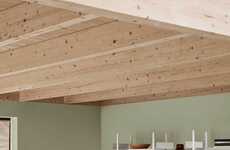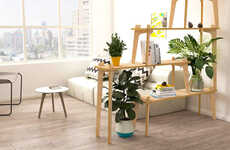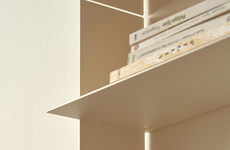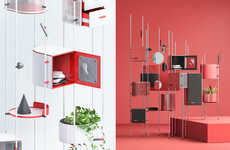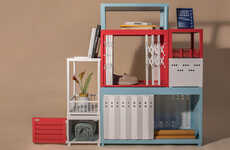
The Tipi Modular Shelving System Adapts to Users' Changing Needs
Amelia Roblin — February 6, 2014 — Eco
It's enlightening to note that the Tipi Modular Shelving System was inspired by the the lifestyle of backpacking. The designer, Assaf Israel, came to appreciate the value of lightweight and adaptable living over the course of one year of traveling. Such discoveries helped to produce a piece of furniture that's easy to assemble, to disassemble, and to accommodate all sorts of needs in one's diverse domestic environment.
The Joynout Studio designer used solid wood and birch plywood that are produced by CNC cutting; bound ropes and just 12 screws help to hold the whole storage system together. Two teepee structures act as the vertical frame for the unit, bracing long ledges that sit around them securely with their cutout holes. The Tipi Modular Shelving System can hold baskets, plants, books and clothes, functioning as a desk, a closet or a bookcase.
The Joynout Studio designer used solid wood and birch plywood that are produced by CNC cutting; bound ropes and just 12 screws help to hold the whole storage system together. Two teepee structures act as the vertical frame for the unit, bracing long ledges that sit around them securely with their cutout holes. The Tipi Modular Shelving System can hold baskets, plants, books and clothes, functioning as a desk, a closet or a bookcase.
Trend Themes
1. Modular Shelving Systems - Opportunity for furniture designers to create adaptable furniture inspired by the lifestyle of backpacking.
2. Lightweight Living - Opportunity for designers to create furniture that adapts and caters to the needs of constantly changing environments.
3. Minimalistic Design - Opportunity to develop furniture that requires few materials and is easy to assemble and disassemble.
Industry Implications
1. Furniture Industry - Opportunity for furniture manufacturers and designers to cater to modern day minimalistic living and the need for adaptable furniture.
2. Design Industry - Opportunity for designers to come up with new ideas that cater to the constantly changing needs of modern day minimalistic living.
3. Sustainability Industry - Opportunity for sustainable furniture manufacturers to produce furniture that requires few materials and can adapt to the needs of modern day minimalistic living.
6.1
Score
Popularity
Activity
Freshness


